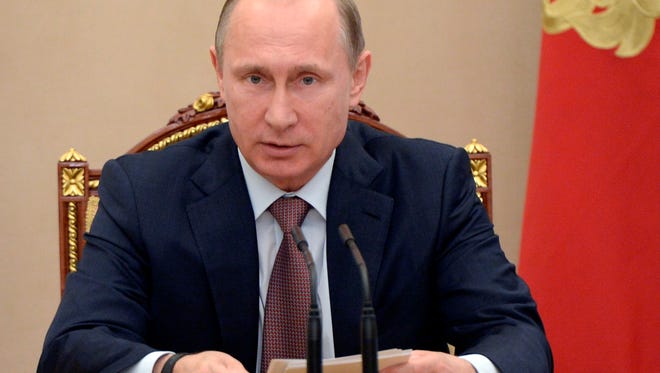House passes Russia sanctions bill

The House of Representatives overwhelmingly passed a bill Tuesday that toughens sanctions on Russia for its alleged meddling in the 2016 presidential election — and makes it harder for President Trump to ease punitive measures against Moscow.
The vote, 419-3, followed a bipartisan agreement reached over the weekend between House and Senate negotiators and comes amid growing scrutiny by Congress and a special prosecutor of possible links between Russian officials and the Trump campaign.
The measure now heads to the Senate for a vote. The bill could be sent to Trump to sign it into law before Congress begins its August recess.
Read more:
Congress strikes deal on Russia sanctions, despite Trump objection
Treasury fines Exxon $2M for 'reckless disregard' of Russia sanctions under Rex Tillerson
The bill punishes Russia for meddling in the U.S. presidential elections and for its military aggression in Ukraine and Syria. Russia has not done enough to implement a cease-fire in eastern Ukraine, where Russian-backed separatists are fighting government troops, according to the State Department. The bill also targets Iran and North Korea for their illicit ballistic missile programs and support for terrorism.
Sen. Chuck Schumer, D-N.Y., urged the Senate to quickly pass the measure and send it to the president.
"Passing the bill on a bipartisan basis will send a strong signal to the White House that the Kremlin needs to be held accountable for meddling in last year's election,” Schumer said.
Rep. Ed Royce, R-Calif., chairman of the House Foreign Affairs Committee, said the bill "empowers Congress to review and to disapprove of any sanctions relief," that Trump might offer to Russia. "This strong oversight is necessary and it is appropriate," he said.
The bill codifies sanctions imposed by President Barack Obama over Russia's alleged interference in the presidential election to aid Trump. That is the firm conclusion of the U.S. intelligence community, but Trump said that the allegation is not backed up by evidence and is being promoted by critics to discredit his election.
The sanctions, which primarily target Russian oil and gas projects with companies based in the U.S., Germany and other countries, will be harder for Trump to lift because he'll need congressional approval.
The Trump administration “has shown over and over that they’re willing to cozy up to Putin,” said Rep. Eliot Engel, D-N.Y., the top Democrat on the House Foreign Affairs Committee. “But here’s the truth: Russia is not our ally. Putin wants to harm the United States, splinter our alliances, and undermine western democracy. This Congress will not allow him to succeed.”
Russian and European officials have warned that if signed by Trump, the measure could worsen relations between the U.S., its allies and Russia.
The proposed sanctions have drawn condemnation from U.S. allies in the European Union, including German Chancellor Angela Merkel, and from Russian President Vladimir Putin, who said the sanctions would be “harmful” to U.S.-Russian ties.
Russian Sen. Aleksey Pushkov predicted Tuesday that sanctions would create problems with Europe and Russia, but not ease tensions with Trump's domestic rivals.
“If Trump signs the sanctions bill, he will not calm down his enemies — they desire his impeachment,” Pushkov said. “But he will inflict double damage — to relations with Russia and the European Union at the same time,” he said, according to the Russian news site RT.
E.U. commissioners oppose the new sanctions and are ready to retaliate, if necessary, Radio Free Europe reported Tuesday, citing multiple unnamed sources. European leaders seek to protect their businesses and Brussels' ability to set its own energy policies with Russia without interference from the U.S., which has an interest in gaining market share for its own energy suppliers, the news agency reported.
Rep. Tim Ryan, D-Ohio, said the bill may ruffle Europeans initially but it will help them in the long run because it will hurt Russia's ability to exploit gas — its number one export which it uses to apply political pressure on its clients.
"I know Germany isn’t happy about it, but this is something we have to do," Ryan said. "We have to maintain a focus on how we get our gas from here in the United States to our allies in Europe so they’re not so dependent on the Russians, which is part and parcel of what this is all about."
Some senators urged their House colleagues to pass the bill because they say the integrity of the 2018 midterm elections is at stake.
“We must ensure that Russia does not successfully interfere again,” said Sen. Jeff Coons, D-Del., in a statement. “It is crucial that the House, the Senate, and the White House enact this bill quickly and protect our democracy moving forward.”
Trump had objected to the bill's limits on his ability to lift or ease the sanctions. The Senate passed an earlier version of the bill 98-2.
“This demonstrates that despite the president’s intentions, American policy toward an aggressive Kremlin is becoming stronger,” said John Herbst, a former U.S. ambassador to Ukraine and Uzbekistan, two former Soviet republics.